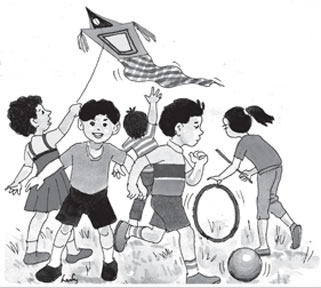Children and development

Children are the future of any society. Even more than the bodies of
the young of our species, their minds are fragile and it is in these
fragile minds that the fate of our posterity will be decided. The manner
in which they are shaped will determine the future contours of society.
The song ‘Schooldays’ in the musical ‘Goodbye Mr Chips’ has the
lyric:
‘Schooldays, so they tell us
Are the most sublime of our lives.
We’ll have the time of our lives
It’s the absolute prime of our lives...’
However, the days of the ordinary school-goer in this country are
anything but sublime.
The average urban school child begins their day at about 4 a.m. and
has to be ready and on the main road to be picked up by a school van or
a school bus by 5 a.m. The child will invariably be toting a heavy bag
containing a full load of books - it is a wonder they can lift their
bags at all.
There follows a long ride in a vehicle crowded with other
schoolchildren. In the case of the average rural schoolchild, substitute
tractor or shanks’pony for school van.
 The student must then sit through eight long classes, in crowded, hot
and uncomfortable classrooms, lectured by invariably indifferent,
uninterested and sometimes ignorant teachers. This is followed by a late
lunch. The student must then sit through eight long classes, in crowded, hot
and uncomfortable classrooms, lectured by invariably indifferent,
uninterested and sometimes ignorant teachers. This is followed by a late
lunch.
Then follow hours of tuition classes, in which the experience of
school is repeated - crowded, hot and uncomfortable classrooms, but the
lecturers will probably be more interested; they are likely to be the
same teachers as at school, but this time with the added monetary
incentive of tuition fees.
Finally, the child will travel home at night, to eat, do homework and
then sleep. The only real breaks -apart from eating - in which some fun
can be had are those involving extra-curricular activities at school and
a little television in the evening.
The only play time most children have is on holidays; weekends also
involving tuition classes plus Sunday religious school. Even Montessori
schoolchildren get tuition nowadays. What began half a century ago as a
little extra coaching in weak subjects for weak students has now become
a soul-destroying pandemic which consumes each and every schoolchild
from four to 18 years old. From the 1970s on, efforts were made to make
school curricula more relevant and more interesting, as against the
boring and often irrelevant subject matter coming down from colonial
times. However, insufficient training of teachers (combined with the
indifference on the part of the latter) nullified most of the progress
made in this field. Subjects are anyway only of interest in the extent
to which passing them at examinations will propel the student further up
the ladder of career advancement.
Even extra-curricular activities are often indulged in for the
certificates that they will generate, which will in turn (it is hoped)
influence potential future employers to recruit the holders.
Unfortunately, even the term-end holidays are short in duration. And
during them children do not have much fun in the sense of playtime. Play
now involves a high proportion of electronic gaming, not intrinsically
bad but certainly damaging to children when over-indulged in.
Children are hence much more open to inputs from television
programmes; commercial television is the bane of good upbringing,
inflicting severe mental insults to unformed brains. Children are driven
to junk foods, to expensive toys, to branded garments and to other
expensive but equally unrewarding pursuits.
This is most apparent in children in so-called International Schools,
many of whom have access to satellite television and who imitate what
they see; now it is de-rigueur among even pre-pubescents to form
pseudo-sexual bonds - they pair up in boy-friend/girl-friend ‘couples’,
enchantingly cute but symptomatic of a deeper malaise.
The cumulative effect of all the stresses and strains caused by the
aforesaid is a deeply stressed childhood. The an overall effect is a
severely traumatised generation having little knowledge outside that
garnered in tuition classes and from TV programmes.
In comparison, children in more economically advanced countries have
a relatively cushy time, with little academic work after school, plenty
of play-time and long holidays. They are more relaxed, better adjusted
and still are not bad academically.
It is instructive to observe the children of South Koreans working in
Sri Lanka, who study in Sri Lankan schools. Koreans are among those with
the highest educational attainments in the world, and their offspring
studying here are no exceptions. Yet, they visibly do not undergo the
same stress as do the indigenous schoolchildren, being far more relaxed
and having more free time.
It is no wonder that the children going to university suddenly find
the restrictions all gone and haze (‘rag’ is far too mild a term to
describe it) novices; nor is it a wonder that this violent hazing has
descended from campuses to schools.
The children of this country do not spend their prime having the time
of their lives; not the best of times, but the worst of times. It is not
necessary to beat a child in order to ill-treat them.
It is vital that the authorities get together with parents and work
out the means to rectify this position.
|



